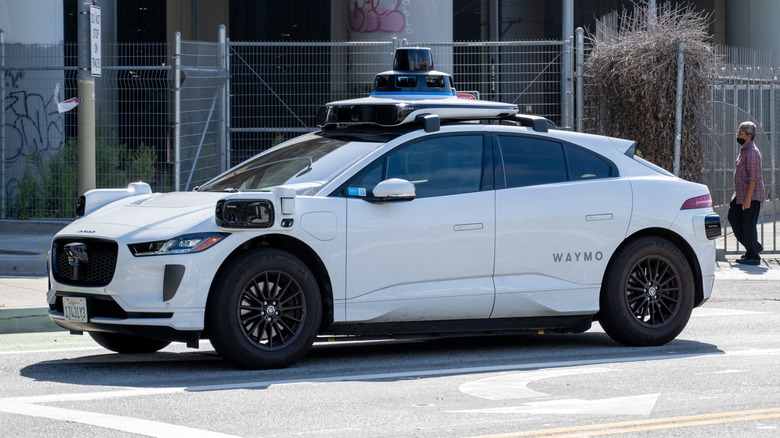Who Gets The Ticket When A Cop Pulls Over A Driverless Car?
As autonomous driving technology and driverless taxis continue to become more normal on American streets, the laws that govern this technology are lagging behind. Waymo, a California-based robotaxi company has recently seen its autonomous vehicles have run-ins with law enforcement. However, when officers pulled over the Waymo vehicle, they weren't able to give any traffic violations as there was no driver behind the wheels.
Police officers in San Bruno, California were working a DUI checkpoint when a Waymo vehicle with nobody behind the wheel made an illegal U-turn. The officers then pulled the vehicle over, although they didn't issue a ticket as "there was no human driver." Currently, the San Bruno Police Department is unable to do anything about autonomous vehicles making traffic violations as there is no law that allows the department to issue citations to autonomous vehicles.
Critics of the San Bruno Police Department claim the department is not being strict enough on the autonomous vehicle company. According to WLNS 6 News, the department responded saying, "For those who believe that we are being lenient, there is legislation in the works that will allow officers to issue the company notices." In an internal memo obtained by the NBC Bay Area Investigative Unit, San Francisco Police Chief Bill Scott stated that officers will issue "no citation for a moving violation if the [autonomous vehicle] is being operated in a driverless mode."
When will legislation match technology?
The legislation that governs technology usually lags behind the technology's introduction. The first gasoline-powered automobiles to hit the road in the United States came in 1896 from two brothers, Charles and Frank Duryea. However, the first statewide traffic law wasn't made until 1901, when Connecticut created the first speed limit. It was not until 1910 when New York created the first DUI law.
The situation is slightly different when lawmakers look at autonomous vehicles. For one, the autonomous vehicles that are being sold to consumers today are far from truly autonomous. There are six levels of autonomous driving technology, with Level 0 being driver safety aids like forward collision warning and Level 5 being fully autonomous vehicles. The semi-autonomous vehicles on the road today are considered to be Level 3. Because of that, any legislation that gets made for the current autonomous technology will be obsolete when the technology itself improves.
In 2025 alone, more than 65 bills have been introduced in 25 states that deal directly with autonomous vehicles. For the federal government, the most recently introduced bill focusing on autonomous vehicles is the "Autonomous Vehicle Acceleration Act of 2025." This bill, introduced in the Senate, aims to make sure the United States is at the forefront of autonomous vehicle technology.

